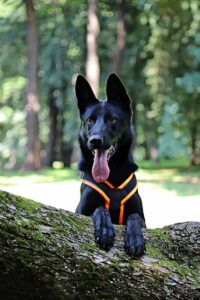The German Shepherds stand as one of the most captivating and widely recognized dog breeds in the world, revered not only for their striking appearance, but also for their remarkable intelligence and versatility. Renowned for their loyalty and courage, these dogs serve in a variety of roles, from family companions to working dogs in police and military operations. But is a German Shepherd the right dog for you and your family?
Table of Contents
Don’t Think Twice It’s All Right
It is not alright. I often think when I see these questions having raised my German Shepherd dog Jasper to almost two years, that is the wrong question. How can you make a good decision if you are not asking the right question? The right question, it seems to me, is are you the right owners for German Shepherd? It’s important you judge that carefully, as shelters are full of German Shepherds whose “owners” failed to do so, as are backyards where these intelligent animals are often regulated to with little interaction with the “owner.”
The allure of a German Shepherd lies in its complex nature, combining strength with gentleness, and an eagerness to learn with an instinct to protect, making them a preferred choice for many dog enthusiasts and professionals alike. But they are not a breed for every situation, person or family. Some of it depends on the bloodlines your particular German Shepherd comes from, and some of it depends on what your own character is. German Shepherds are wonderful, but by no means easy dogs.
Understanding the German Shepherd Breed
Understanding the German Shepherd Breed goes beyond admiring their physical attributes and intelligence. These dogs possess a high energy level and require regular, vigorous exercise to keep them mentally and physically satisfied. Without proper exercise, they may display behaviors symptomatic of restlessness or boredom, such as digging, barking, or chewing. Additionally, their innate protective instincts call for early socialization and training to ensure they develop into well-behaved adult dogs. German Shepherds thrive on challenge and need consistent, positive reinforcement training methods. Their ability to form strong bonds with their family, means they are fiercely loyal and protective, making them excellent watchdogs. However, this also means they can be wary of strangers and require careful introduction to new people and environments for the next 10-14 years.
German Shepherd Physical Characteristics and Health Considerations
German Shepherds are large, muscular dogs, displaying confidence and strength through their stance and demeanor. They typically weigh between 50 to 90 pounds, with males generally larger than females. These dogs have a distinctive look with their double coat, which can vary in color from black and tan to sable or all black. Their coat requires regular grooming to “manage,” what a misnomer, shedding and maintaining its condition. Really, there is no managing a German Shepherd’s shedding. You will have dog hair no matter how well you brush him.
When it comes to health, German Shepherds are generally robust but, like any breed, they are prone to certain health issues. It is crucial for potential owners to be aware of these potential health concerns, which include hip and elbow dysplasia, degenerative myelopathy, and gastric problems. Regular veterinary checks are essential to catch any health issues early. Adopting from a reputable breeder who tests their breeding dogs for genetic conditions can also help ensure the healthiest possible start in life.
Did I mention Germn Shepherd’s are Muscular?
Jasper could pull me over flat on my face and drag me 10 feet if my hand was caught in his leash, by the time he has 7 months old. That’s why it’s best to fold that leash up in your hand, not wrap it around your hand. You will not get dragged as far. This is not an exaggeration, and I have the scar to prove it! I’m rather fluffy too. German Shepherds are powerful, athletic dogs. Now to be fair, any large powerful dog breed can do this and German Shepherds are not the only prey driven dog. (Without fail, this happened when Jasper saw another dog and his defensive or prey drive was engaged )

He always looked confused about why I was laying on the ground. Once he got over loosing his mind about the Chihuahua threat, that is.
My seven pound Pappillion Dottie has a very high prey drive and often brings me dead animals of various kinds to prove it. In fact, it was she, not Jasper that proudly brought me a very dead possum as big as she was. They have separate yards so it was not Jasper. What she cannot do is pull me over on my face or harm someone else’s dog. Although she did a good job on that possum.
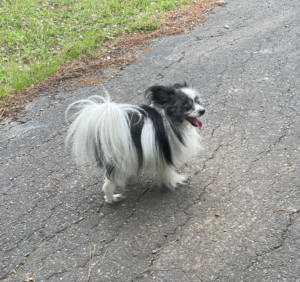
Temperament and Behavioral Traits
German Shepherds are known for their courage, intelligence, and versatility, traits that have made them one of the most preferred breeds for various roles including police work, search and rescue, and as service dogs. At their core, they are incredibly loyal and have a high capacity for learning, which when combined with their natural protective instincts, can make them excellent family pets as well as guardians. Despite their tough exterior, they possess a sensitive side and crave companionship and affection from their owners. Jasper loves affection.
Working Line vs Show Line
When evaluating German Shepherds, it’s important to distinguish between working line and show line dogs as they exhibit different characteristics and are bred for distinct purposes. Working line German Shepherds are bred primarily for their working abilities and are often seen in roles such as police work, search and rescue, or military service. These dogs have a stronger prey drive, a robust build, and are highly energetic, requiring a lot of mental and physical stimulation. Their focus on functionality often means they have less exaggerated features than their show line counterparts.
On the other hand, show line German Shepherds are bred to conform to specific breed standards that are often set by kennel clubs. This includes a particular emphasis on the dog’s appearance, movement, and temperament. Show line dogs tend to have a more angulated hindquarters, a smoother gait, and a calmer demeanor compared to working line German Shepherds. While they are also capable of being trained for various tasks, the primary focus in breeding these dogs is on their aesthetic qualities and adherence to breed standards.
Working line German Shepherds are not for everyone. They have to be given a job, or they will make one up and it may involve eating your prized apple tree. Even with a job, they may eat your apple tree. Jasper is a medium drive working line German Shepherd. His breeder bred for pet quality, meaning his parents were smart, friendly and not excessively high in drive. His bloodlines are entirely Czech and East German. I wanted that primarily for health reasons, as I had read American Show Line, German Shepherds have high levels of genetic diseases. Medium drive means Jasper only wants my attention 90% of the time instead of 110%, and needs an hour of exercise and training a day instead of 3.
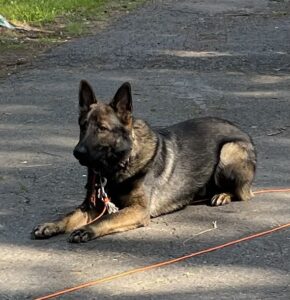
Active Household?
What you will read in various sources is that German shepherds do well in active households that can provide them with plenty of mental and physical stimulation. Without proper exercise and mental engagement, they may resort to undesirable behaviors out of boredom or anxiety. This is true to a point. However, I’m 65 and not a marathon runner. In fact, I don’t run. At all. So I would not call my household a particularly active one. What I do have is time. My work is such that I have time. I have no young children whose schedules need to be juggled.
When I decided to get Jasper, my plan was to ride my trike and have Jasper run along with me. Now that I have him under control we can do that. We also swim which Jasper adores and when we go to Arkansas property, he gets to run pretty free. My point is, there are different types of active. But you will definitely have to have a plan for exercise of both body and mind. In fact, exercising their mind may be the more important of the two. These dogs NEED to train.
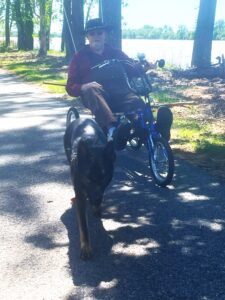
Positive Reinforcement Works Best?
You will also read that positive reinforcement techniques work best when training German Shepherds, as they respond well to challenges and are eager to please their handlers. That’s true, to a point. Most people who say that seem to own some sort of fluffy breed like golden retrievers. I did see one guy who was a proponent of positive only training, and he had Malinous and GSD. He seemed to be making that work. However, he looked to be about 6’4″ and 240. He probably did not get face planted very often, if at all. He did not have to worry his dog would be able to get away from him and perhaps harm another dog.
Positive training worked well for everything with Jasper, EXCEPT when he was in that hyper-aroused state of fight or flight. At that point, he was literally “out of his mind” much like a two year old in a tantrum, only a 90 pound two year old with inch long knives for teeth. I was simply not physically strong enough to make a simple collar or even a prong collar work safely.
To desensitize Jasper safely to his triggers, I first had to have him under control. I could have done that by putting him on a chain in my backyard and never taking him out. I would have considered that failing him. Instead, we took a stint at board and train and an e-collar. For us, it was a life saver.
There’s lots of conflict over e-collars. They can be misused. Jasper’s collar is meant only as direction, never punishment. At this point, he only needs sound (the collar has sound as well as stimulation) in 9 out of ten situations. In the 1 out of 10 times he needs stimulation, generally because of another dog, I am happy to have it available. Our lives together would be very constrained without that control. The trainer trained me on the correct way to use the collar. As far as I can tell, Jasper seems none-the-worse for it, and he is slowly getting over his dog reactivity.
German Shepherds as Family Dogs
German Shepherds, with their innate loyalty and protective nature, can make exceptional family dogs. Their ability to form strong bonds with family members means they often become closely integrated into family life, showing particular affection and gentleness towards children. When socialized properly from a young age, they exhibit patience and tolerance, making them well-suited to the dynamics of a bustling household. However, it is crucial for families to remember that German Shepherds require attention, engagement, and plenty of exercise to thrive within a family setting. Their intelligence and energy levels mean they thrive on interaction and challenges, which can be met through family activities and training. The commitment to their physical and mental well-being not only ensures the health and happiness of the dog but strengthens the bond between the dog and its family, making a German Shepherd not just a pet, but a valued family member.
Compatibility with Children and Other Pets
German Shepherds, acclaimed for their gentle temperament towards family members, display a high degree of adaptability and patience with children, often acting as vigilant protectors and playful companions. Their ability to understand and follow commands makes them ideal for households with kids, as they can be taught to play gently and recognize boundaries. Furthermore, when properly socialized from an early age, German Shepherds can coexist harmoniously with other pets, including dogs and cats. This socialization process is crucial for preventing territorial or aggressive behaviors and encouraging positive interactions. It’s important for potential owners to introduce their German Shepherd to various social scenarios involving children and animals early on, ensuring a well-adjusted and sociable family pet.
Why Chance It?

Jasper loves playing with my grandchildren, and has adapted to cats and my small Papillons. However, I would no more leave a young child or a small dog alone with such a large dog, than I’d leave a loaded gun lying around. Jasper’s never left alone with either. This requires management. Jasper is never out of his crate with the small dogs or my grandsons unless I am there. Why chance it? My yard is divided, with a front space for the small dogs and a separate back space for Jasper. Is this something you are willing or even want to take on? If not, don’t get a German Shepherd, in particular a working line one. I knew what I was getting into. I had researched carefully, even so, Jasper’s dog reactivity took me by surprise. We have adapted. I have no regrets. And…, it has been a challenge. Just consider, what if your cute little puppy does not adapt and hurts your smaller dog. That should not happen if you manage the dogs correctly but manging is a good deal of daily work for possibly 10-12 years.
German Shepherd’s Role in Home Security
German Shepherds are naturally protective, making them one of the most reliable breeds for home security. Their acute senses, especially hearing and smell, allow them to detect unfamiliar activities often before humans become aware. This heightened sense of awareness, combined with their loyalty and instinct to protect their pack, translates into German Shepherds being excellent deterrents against potential intruders. They are not prone to unnecessary aggression, but their presence and bark alone can be a significant deterrent. Proper training can refine these instincts, helping them distinguish between normal and suspicious activities, ensuring they react appropriately to protect their home and family.
People often get this backwards. A dog properly trained in protection is much less likely to inadvertently hurt someone than an untrained dog with all the same instincts and impulses and no training.
Training and Exercise Needs
German Shepherds are highly intelligent and energetic dogs that require regular mental and physical stimulation. Training should start early, focusing on obedience, socialization, and positive reinforcement techniques to encourage good behavior. Consistency is key in training, as is patience and understanding. These dogs thrive on challenges and learning new tasks, making them excellent candidates for advanced training and dog sports. If I have a regret around Jasper, it would be that, because he is dog reactive, I have been limited in dog sports with him. Dog sports do not allow e-collars.
Exercise is equally important, with daily walks, playtime in a secure area, and engagement in activities that stimulate their mind and body being essential. Without adequate exercise, German Shepherds can develop behavioral issues due to pent-up energy. Balancing their training and exercise needs is pivotal for their well-being and happiness, making them well-rounded companions. These dogs need a job. Jasper and I train daily and he is able to ride with me when I have appointments, which he considers his “job.” Certainly, I do not expect to ever be carjacked!
Importance of Early Socialization and Obedience Training
Early socialization and obedience training are crucial for developing a well-behaved and confident German Shepherd. Exposure to different people, animals, environments, and situations from a young age helps prevent the development of unwanted behaviors such as anxiety, aggression, or fearfulness. Socialization teaches them how to react and interact appropriately with various stimuli, promoting a more adaptable and less reactive adult dog. Meanwhile, obedience training establishes clear communication between the dog and its owner, fostering a mutual respect and understanding. It allows owners to effectively manage their dogs in various situations, ensuring their safety and the safety of others. Plus, the process of training strengthens the bond between a dog and its owner, providing a foundation for a trusting and lasting relationship.
The caveat to this is, the right early socialization and training. If you take your puppy to a dog park (not recommended) and he gets bullied or even attacked you have set him up for dog reactivity that may never get resolved.
Dog Obedience Classes
While it is possible to train a German Shepherd on your own, enrolling in dog obedience classes can be highly beneficial. These classes offer structured and supervised training sessions with qualified trainers who understand the breed’s specific needs and behaviors. Additionally, attending classes provides opportunities for socialization, exposing your dog to new people and dogs in a controlled environment.

When I bought Jasper home, I was full of plans to get involved in the local AKC training club with the goal of getting into some type of dog sport with him. I took him to three AKC classes. The first one he was 4 months old. It was a puppy class. He did well. The second one, his dog’s reactivity became entrenched. Jasper and two other dogs were in the class and they all barked at each other and lunged. If I had it to do over, and I knew what I knew now, we would have left that class. To be fair, he might have become dog reactive anyway, but that class gave him 6 weeks of practice at it.
AKC classes are not run by dog trainers. They are run by dog lovers who train their dogs and enjoy helping other people do so. They are not set up to handle problems like dog reactivity. They did everything they could to help, and I can highly recommend them for basic training, but they are not equipped to handle anything else. They did try to find a local trainer for me but that did not work out so well either.
So it begs the question, are you ready to take on a dog breed that may have none of these issues, but may well have even worse ones, even if you are trying to do everything right? Do you have the time, resources, and energy? Jasper and I were fortunate, our breeder was knowledgeable, and we ended up with the right trainer.
Time, Money, and Pieces of Your Heart
Having a problem dog is a little like having a problem kid. Everybody looks at you funny, and the more outgoing ones tell you it’s your fault. Most likely, there’s some truth to that. But telling someone to just quit being anxious is a bit like telling them if you just wouldn’t feel what you feel the problem would be resolved. Feelings are not a choice. Actions are. Feelings are not. The more reactive Jasper was, the more anxious I became if we were around any other dogs. Are you prepared for judgment, should your big, powerful, dog reactive, but otherwise goofy and sweet GSD become reactive or develop some other issue that will make your persona non gratis in any dog community you hoped to be a part of?
I would estimate I have spent at least $10,000 on Jasper, between classes, equipment and board and train. I had it to spend fortunately. Do you? For all that investment as of today, Jasper and I are still unable to do dog sports other than the occasional one my breeder puts on that’s small enough to allow her to control the flow of dogs. Jasper loves scent work, and NASDA does various things that involve that. Dog sports are geared for the majority, which is understandable, it’s a business after all. Understanding that does not lessen my sadness, Jasper, and I can’t do much of this.
Caring for Your German Shepherd
Grooming, Feeding, and Healthcare Tips
Proper grooming is essential for a German Shepherd’s health and comfort. Regular brushing, at least a few times a week, helps reduce shedding and keeps their coat healthy and shiny. Paying attention to nail care, ear cleaning, and dental hygiene is also critical to prevent common health issues.
When it comes to feeding, quality nutrition tailored to their life stage, size, and energy level is paramount. German Shepherds thrive on a balanced diet rich in proteins, carbohydrates, fats, vitamins, and minerals. It’s important to consult with a veterinarian to determine the optimal diet plan, taking into account any specific health needs or weight management issues.
Healthcare is another critical aspect of caring for a German Shepherd. Regular veterinary check-ups, vaccinations, and preventive measures against parasites are non-negotiable to maintain their health. Being proactive about health concerns, such as hip dysplasia and other genetic conditions common in the breed, can lead to early detection and management. Owners should be vigilant and informed about the signs of these conditions to ensure their dog receives timely care.
Common Health Issues to Watch for
German Shepherds are susceptible to specific health issues that owners should be aware of to ensure their pet’s longevity and well-being. Hip and elbow dysplasia are common in this breed, leading to arthritis and mobility problems later in life. Early screening and maintaining a healthy weight can mitigate the effects. Degenerative myelopathy, a progressive disease of the spinal cord, is also prevalent among German Shepherds, highlighting the need for genetic testing where possible.
Another concern is bloat or gastric dilatation-volvulus (GDV), a life-threatening condition that requires immediate veterinary intervention. Owners should practice preventive measures, such as feeding smaller, more frequent meals and avoiding vigorous exercise around feeding times.
Finally, German Shepherds can experience skin conditions like allergies and eczema. Regular grooming and veterinary check-ups can help manage these issues, ensuring the dog’s comfort and health. Being proactive and vigilant about these common health problems can help German Shepherd owners provide the best care for their loyal companions.
Is a German Shepherd the Right Dog for You?
Questions to ask Yourself Before Getting a German Shepherd
Do I have the space?
Jasper’s crate, place bed, food bin and equipment take up a good deal of real estate in my house.
Do you have the time?
German Shepherds are highly intelligent and active dogs that need mental stimulation and physical activity to thrive. Daily walks and playtime are essential to keep them happy and healthy. You are asking for problems if you don’t have this time to give every single day for the next 12 years.
Do you have a fenced yard?
I recommend this. Luckily, I have a large yard for him to roam and play in. German Shepherds require sufficient space to exercise and explore, both indoors and outdoors.
Do you have the extra resources for food, supplies, training and vets?
I paid $2000 for Jasper. He has a great pedigree for the dog sports I wanted to do with him. An average board and train is 3500 dollars for a reputable trainer.
Do you have a fairly dominant personality?
If you don’t have leadership, your stubborn, naturally dominant German Shepherd dog will, and that is a disaster for the dog and your household.
Are you ready to be committed through all the possible issues that can and probably will occur?
Really think about these issues. I have been through three trainers and two dog clubs before finding a place for Jasper that works and the trainer is 4 hours away.
Are you prepared for the possible rejection and guardedness you may face from the dog community?
People gravitated away from Jasper in class because he was big and had a booming voice. The AKC club could not accommodate a dog with Jasper’s issues. The first trainer I tried hit him with a shoe. NASDA, except for my breeders trials where she accommodates Jasper, will not necessarily let your dog trial.
For instance, at one trial, two little neighborhood boys came over with their dog unleashed. The trial leader was unwilling to ask them to leash their dog and move to another area while Jasper ran his trial, as they were right beside his run. She said it was a problem of my training. Perhaps so, but had I let Jasper run and he hurt either boy or their dog it could have been her problem for allowing it. Luckily, I wasn’t willing to chance it even if she was.
You Don’t Know What You Don’t Know
I read multiple books and watched countless YouTubes before I decided to get Jasper. I was prepared to have him in training classes. I couldn’t know that the training class itself, might trigger dog reactivity in Jasper. Once I did know, I sat about finding a trainer. The first one hit him with a shoe. My experience has been help can be difficult to find. Jasper’s luck was that I take my commitments seriously. But I was in a place where I could do that. I had no young children and my finances were secure.
Do I have any regrets? No
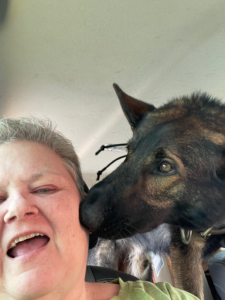
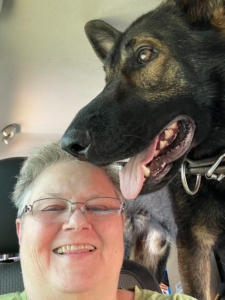
Where to Find a Healthy German Shepherd
Finding a healthy German Shepherd starts with identifying reputable breeders or rescue organizations dedicated to the well-being and genetic soundness of their dogs. Reputable breeders perform health screenings and genetic testing on their breeding stock to reduce the risk of hereditary conditions common in the breed, such as hip dysplasia, elbow dysplasia, and degenerative myelopathy. They should be transparent about the health history of their puppies’ parents and provide health guarantees. A genetically unsound GSD beyond the physical issue you may face, could be neurologically unsound resulting in fearfulness or aggression that because it is genetic may not be helped by training.
GSD Rescues
Rescue organizations should also provide medical history and any known health issues, so you know going in what you could be dealing with. Many rescues are wonderful dogs whose owners became sick and unable to keep them. Many more were dropped off by “owners” who got in over their heads. They may be older and have medical issues the owners couldn’t handle financially. You can expect you may face behavior issues. It’s a sad situation and not the dogs fault, so if you think you are up for adopting you will be doing a good thing.
German Shepherd Dog Clubs
Additionally, engaging with German Shepherd breed clubs and attending breed-specific events can offer valuable insights and connections to trusted sources for healthy dogs. Always visit the breeder or rescue in person, observe the living conditions, and meet the dogs to ensure their health and temperament meet your expectations.
The Lifelong Commitment of Owning a German Shepherd
Choosing to welcome a German Shepherd into your home is a decision that extends beyond the admiration for their intelligence and loyalty. It is a lifelong commitment that encompasses understanding their physical needs, mental stimulation requirements, and potential health issues. These dogs thrive on companionship and require consistent training, exercise, and socialization to become well-adjusted family members. Ensuring you have the time, resources, and patience to dedicate to their well-being is crucial for a harmonious relationship.
Conclusion: Making an Informed Decision
In conclusion, acquiring a German Shepherd should be a carefully considered decision. By being cognizant of the health risks, understanding the importance of choosing a reputable breeder or considering rescue, and recognizing the lifelong commitment these magnificent dogs require, you can ensure a fulfilling and responsible ownership experience. Remember, a German Shepherd is not just a pet but a loyal companion that will be a part of your life for many years. Making an informed decision with their best interest in heart will lead to a rewarding relationship filled with mutual respect and love.

